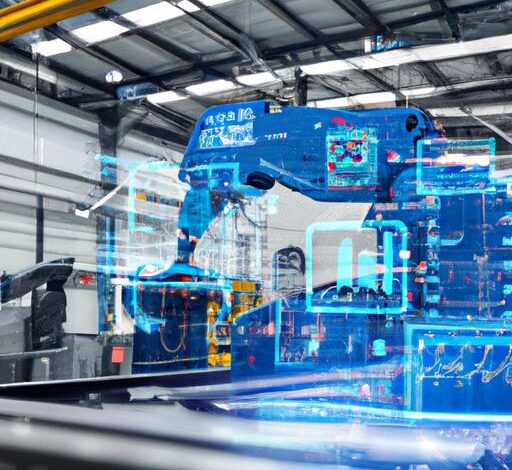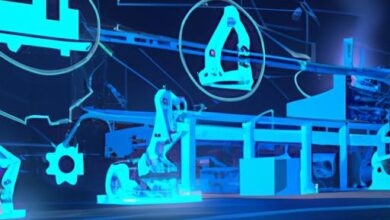Embracing the Future: Industry 4.0 Companies Revolutionizing Modern Business

Introduction to Industry 4.0 Companies
Welcome to the era of Industry 4.0, where technological advancements have paved the way for a new wave of innovation and efficiency in the business world. In this article, we will delve into the realm of industry 4.0 companies and explore how they are reshaping the landscape of modern business. So, let’s embark on this exciting journey together!
Defining Industry 4.0 and its significance in modern business
Industry 4.0, also known as the fourth industrial revolution, refers to the integration of cutting-edge technologies into traditional manufacturing and production processes. It encompasses a wide range of digital advancements, including the Internet of Things (IoT), artificial intelligence (AI), big data analytics, and more. This convergence of technologies facilitates seamless communication, automation, and intelligent decision-making, revolutionizing the way companies operate.
Industry 4.0 brings forth a myriad of benefits for businesses, making it a pivotal element in their growth and success. By embracing this paradigm shift, companies can enhance their overall efficiency, productivity, and competitiveness in the market. With the ability to connect devices and machines through IoT, businesses can optimize their operations, streamline workflows, and minimize human errors. This leads to shorter production cycles, reduced costs, and increased profitability.
Explanation of how companies are adapting to the Industry 4.0 paradigm
The relentless pursuit of progress has driven companies to adapt swiftly to the Industry 4.0 revolution. They are actively embracing emerging technologies and reshaping their strategies to harness the full potential of Industry 4.0. From small startups to multinational corporations, businesses across various industries are integrating smart technologies into their operations.
Companies are leveraging AI to automate routine tasks, enabling employees to focus on more complex and creative endeavors. Through real-time data analytics, they gain valuable insights into customer preferences, market trends, and production patterns, enabling them to make data-driven decisions with precision and agility. This data-centric approach empowers companies to offer highly personalized and customized solutions, elevating customer satisfaction to new heights.
In conclusion, Industry 4.0 is not just a buzzword; it is a transformative force that is revolutionizing the business landscape. By embracing the principles of Industry 4.0, companies can unlock unprecedented opportunities for growth, efficiency, and innovation. In the upcoming sections, we will explore the benefits, key technologies, successful companies, challenges, and future outlook of Industry 4.0, providing you with a comprehensive understanding of this remarkable phenomenon. So, let’s delve deeper into the world of Industry 4.0 and witness its profound impact together!
Benefits of Industry 4.0 for Companies
In the era of Industry 4.0, companies are reaping remarkable benefits that propel them towards unprecedented levels of success. Let’s explore some of the key advantages that Industry 4.0 brings to the table.
Increased efficiency and productivity through automation and data exchange
Industry 4.0 leverages automation and seamless data exchange to optimize processes, leading to enhanced efficiency and productivity. By integrating smart technologies, companies can automate routine tasks, reducing human errors and freeing up valuable time for employees to focus on more critical responsibilities. This automation not only speeds up production cycles but also ensures consistency and precision across operations.
Moreover, Industry 4.0 enables seamless data exchange between machines, systems, and stakeholders. Real-time data is collected and analyzed, providing valuable insights into production trends, supply chain management, and resource allocation. Armed with this information, companies can identify bottlenecks, streamline workflows, and make informed decisions, ultimately boosting efficiency and productivity.
Enhanced decision-making capabilities with real-time data analysis
One of the game-changing benefits of Industry 4.0 is the ability to harness real-time data analysis for decision-making. By leveraging advanced analytics tools, companies can gain valuable insights into various aspects of their business operations. They can track customer behavior, predict market trends, monitor equipment performance, and identify potential risks or opportunities.
With access to real-time data, decision-makers can make informed choices promptly. This agility in decision-making allows companies to respond swiftly to changing market dynamics, optimize resource allocation, and stay one step ahead of the competition. By fostering a data-driven culture, businesses can make more accurate predictions, minimize risks, and capitalize on emerging opportunities.
Improved customer satisfaction through personalized and customized solutions
Industry 4.0 empowers companies to cater to the ever-evolving demands of customers through personalized and customized solutions. By leveraging technologies like AI and IoT, businesses can gather and analyze vast amounts of customer data, providing insights into individual preferences, purchase patterns, and feedback. Armed with this knowledge, companies can deliver tailored products and services, exceeding customer expectations.
Personalization not only enhances customer satisfaction but also builds long-term loyalty. By offering customized experiences, companies can create meaningful connections with their customers, fostering brand advocacy and repeat business. Industry 4.0 enables businesses to establish a deep understanding of their customers and anticipate their needs, ultimately leading to improved customer satisfaction and a sustainable competitive advantage.
In the next sections, we will explore the key technologies in Industry 4.0 companies and delve into the success stories of companies that have effectively implemented Industry 4.0 principles. So, let’s continue our journey through the transformative world of Industry 4.0!
Key Technologies in Industry 4.0 Companies
Embracing Industry 4.0 means harnessing the power of groundbreaking technologies that drive innovation and efficiency. In this section, we will explore the key technologies that underpin Industry 4.0 companies, enabling them to thrive in the digital age.
Internet of Things (IoT) and its role in connecting devices and machines
At the heart of Industry 4.0 lies the Internet of Things (IoT), a network of interconnected devices and machines that communicate and share data seamlessly. IoT enables companies to collect real-time information from various sensors embedded in their manufacturing equipment, supply chains, and even products. This interconnectedness allows businesses to monitor and control operations remotely, optimize resource allocation, and proactively address issues before they escalate. By leveraging IoT, Industry 4.0 companies achieve unprecedented levels of automation, efficiency, and transparency throughout their value chains.
Artificial Intelligence (AI) and its impact on automation and decision-making
Artificial Intelligence (AI) is a game-changer in the Industry 4.0 landscape. By mimicking human intelligence, AI empowers machines to perform tasks that traditionally required human intervention. AI algorithms can analyze vast amounts of data, detect patterns, and make intelligent decisions in real-time. This technology enables Industry 4.0 companies to automate complex processes, enhance productivity, and reduce human errors. From predictive maintenance to quality control and demand forecasting, AI-driven automation revolutionizes operations, ensuring optimal efficiency and cost-effectiveness.
Big data analytics and its contribution to data-driven decision-making
In the era of Industry 4.0, data is the new gold. The abundance of data generated by interconnected devices, machines, and customers presents a tremendous opportunity for companies. Big data analytics allows Industry 4.0 companies to extract valuable insights from this data treasure trove. By analyzing and interpreting data patterns, companies gain a deeper understanding of customer preferences, market trends, and operational performance. Armed with these insights, businesses can make informed, data-driven decisions, fine-tune their strategies, and deliver tailored solutions that resonate with their target audience. Big data analytics fuels innovation, fosters agility, and gives Industry 4.0 companies a competitive edge in the market.
In this section, we have explored the pivotal role of key technologies in Industry 4.0 companies. The Internet of Things (IoT), Artificial Intelligence (AI), and big data analytics form the backbone of this revolution, enabling businesses to connect, automate, and make data-driven decisions. As we move forward, we will delve into the success stories of Industry 4.0 companies, understanding how they have leveraged these technologies to drive growth, adaptability, and customer-centricity. So, let’s continue our journey to unravel the secrets of Industry 4.0 success!
Successful Industry 4.0 Companies
In this section, we will explore some remarkable case studies of companies that have embraced Industry 4.0 and successfully implemented its principles. These trailblazers have harnessed the power of advanced technologies to revolutionize their operations, achieving remarkable achievements and gaining a competitive edge in the market.
Case Studies: Implementing Industry 4.0 Principles
Company A: Transforming Manufacturing with IoT and AI
Company A, a leading automotive manufacturer, has leveraged Industry 4.0 technologies to optimize its production processes. By integrating IoT sensors into their assembly lines, they have achieved real-time monitoring of machinery performance, identifying potential issues before they escalate. This proactive approach has minimized downtime, improved productivity, and reduced maintenance costs. Furthermore, by harnessing AI algorithms, they have developed predictive maintenance models that enable them to schedule maintenance activities precisely, avoiding unexpected breakdowns and maximizing uptime.
Company B: Enhancing Supply Chain Efficiency with Data Analytics
Company B, a global logistics provider, has embraced Industry 4.0 principles to streamline their supply chain operations. By leveraging big data analytics, they have gained valuable insights into their inventory, demand patterns, and transportation routes. This data-driven approach has allowed them to optimize their warehouse management, reducing inventory holding costs while ensuring timely deliveries. Additionally, they have implemented AI-powered predictive modeling to forecast demand accurately, enabling them to plan their resources efficiently and meet customer expectations.
Highlighting Achievements and Competitive Advantages
These successful Industry 4.0 companies have not only achieved remarkable advancements but also gained a significant competitive advantage in their respective industries. By embracing technology-driven innovations, they have been able to:
- Improve operational efficiency and reduce costs through automation and data-driven decision-making.
- Enhance product quality and customer satisfaction through personalized and customized solutions.
- Optimize supply chain management, leading to improved inventory control and faster response times.
- Gain a competitive edge by staying ahead of market trends and rapidly adapting to changing customer demands.
- Drive innovation and foster a culture of continuous improvement, empowering their workforce to embrace new technologies and ideas.
In conclusion, these case studies exemplify the transformative power of Industry 4.0 when effectively implemented by companies. By embracing smart technologies, these industry leaders have achieved remarkable achievements and gained a competitive advantage in today’s fast-paced business environment. Their success stories serve as inspiration for other companies to embark on their Industry 4.0 journey and unlock the vast potential that lies ahead.
Challenges and Risks Faced by Industry 4.0 Companies
As Industry 4.0 continues to reshape the business landscape, it brings with it a unique set of challenges and risks that companies must navigate. In this section, we will explore some of the key obstacles that Industry 4.0 companies face and discuss strategies to overcome them.
Cybersecurity threats and the need for robust protection measures
With increased connectivity and data exchange, Industry 4.0 companies are more vulnerable to cybersecurity threats than ever before. As valuable data flows between devices and systems, it becomes crucial to implement robust protection measures to safeguard against cyberattacks. From ransomware to data breaches, the potential risks can be detrimental to a company’s reputation and financial stability.
To mitigate these risks, companies must prioritize cybersecurity as an integral part of their operations. This involves implementing advanced encryption techniques, regularly updating software and hardware, and conducting thorough vulnerability assessments. Additionally, educating employees about best practices in cybersecurity and fostering a culture of vigilance can significantly enhance a company’s defense against cyber threats.
Workforce upskilling and reskilling to adapt to changes in job roles
The advent of Industry 4.0 brings about a shift in job roles and demands a highly skilled workforce capable of navigating the complex technological landscape. Traditional manual tasks are being automated, requiring employees to develop new skill sets to remain relevant in the industry. This poses a significant challenge for both companies and employees.
Industry 4.0 companies must invest in upskilling and reskilling programs to empower their workforce with the necessary knowledge and skills. This can include providing training in emerging technologies, such as AI and IoT, as well as fostering a culture of continuous learning. By equipping employees with the tools to adapt and thrive in the digital age, companies can ensure a smooth transition and maximize the benefits of Industry 4.0.
Potential job displacement and the need for responsible transition strategies
While Industry 4.0 brings forth numerous opportunities, it also raises concerns about potential job displacement. As automation and AI-powered technologies take center stage, certain job roles may become obsolete or undergo significant transformation. This necessitates the development of responsible transition strategies to support affected employees and ensure a just and inclusive transition.
Industry 4.0 companies must proactively address the potential impact on their workforce by implementing comprehensive retraining and redeployment initiatives. By identifying transferable skills and offering support in acquiring new ones, companies can facilitate the smooth transition of employees into new roles within the organization or even in different industries. Additionally, fostering a culture of agility and adaptability can create an environment where employees feel empowered to embrace change and explore new opportunities.
In conclusion, while Industry 4.0 presents incredible opportunities for businesses, it also brings forth unique challenges and risks. By addressing cybersecurity threats, investing in workforce upskilling, and implementing responsible transition strategies, companies can navigate these challenges and unlock the full potential of Industry 4.0. As we move forward, it is essential to strike a balance between embracing technological advancements and ensuring the well-being and success of all stakeholders involved.
Future Outlook for Industry 4.0 Companies
The future of Industry 4.0 is brimming with endless possibilities and exciting advancements. As technology continues to evolve at an exponential pace, we can expect Industry 4.0 companies to push the boundaries of innovation even further. Let’s take a glimpse into what the future holds for these transformative enterprises.
Emerging trends and advancements shaping the future of Industry 4.0
One significant trend on the horizon is the convergence of technologies. We can anticipate a seamless integration of AI, IoT, big data analytics, cloud computing, and other cutting-edge technologies. This integration will enable Industry 4.0 companies to create interconnected systems that optimize operations, drive efficiency, and unlock new avenues of growth.
The rise of edge computing is another trend that will shape the future of Industry 4.0. With edge computing, data processing and analysis occur closer to the source, reducing latency and enabling real-time decision-making. This decentralization of computing power will enhance the responsiveness of Industry 4.0 systems, making them more agile, efficient, and reliable.
Predictions on how Industry 4.0 will continue to revolutionize various industries
Industry 4.0 is set to reshape countless industries, bringing about significant transformations and unlocking new opportunities. In manufacturing, we can expect fully automated smart factories, where machines communicate seamlessly and self-optimize production processes. This will lead to increased productivity, reduced waste, and enhanced quality control.
The healthcare sector will also witness a revolution driven by Industry 4.0. With the integration of wearable devices, AI-powered diagnostics, and telemedicine, patient care will become more personalized, accessible, and efficient. Remote monitoring and predictive analytics will enable early detection and prevention of diseases, saving countless lives.
The transportation and logistics industry will experience a paradigm shift with autonomous vehicles, smart warehouses, and predictive supply chain management. Industry 4.0 technologies will optimize routes, minimize delivery times, and reduce costs. This will not only streamline operations but also have a positive impact on the environment by reducing carbon emissions.
In conclusion, the future of Industry 4.0 companies is incredibly promising. The convergence of technologies, emerging trends, and transformative advancements will continue to revolutionize industries across the globe. As businesses adapt and embrace these changes, they will unlock unprecedented growth opportunities, enhance efficiency, and deliver unparalleled value to customers. So, buckle up and get ready to witness the awe-inspiring transformation that lies ahead in the realm of Industry 4.0!
Conclusion: So above is the Embracing the Future: Industry 4.0 Companies Revolutionizing Modern Business article. Hopefully with this article you can help you in life, always follow and read our good articles on the website: transfer.dulich3mien.vn



